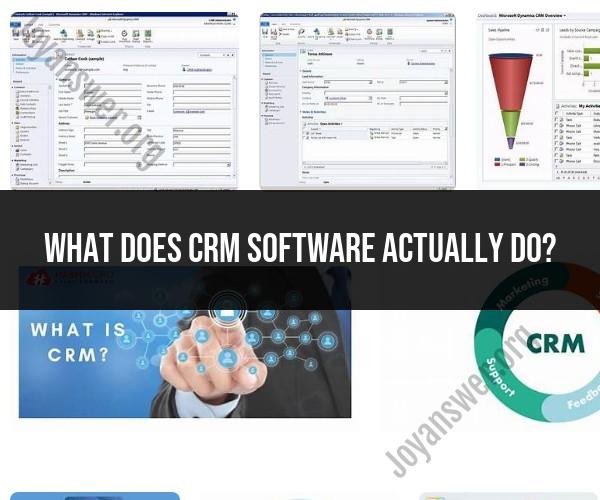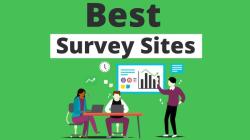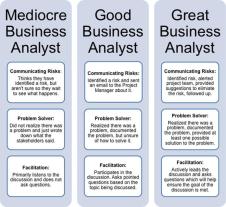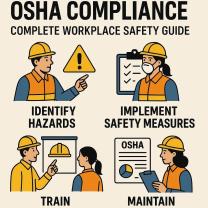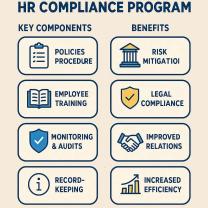What does CRM software actually do?
Customer Relationship Management (CRM) software is designed to help businesses manage and nurture their relationships with customers and prospects. It serves as a central hub for organizing customer data and interactions. Here's what CRM software actually does:
Contact Management:
- CRM software stores and manages detailed contact information for customers, leads, and prospects. This includes names, addresses, phone numbers, email addresses, and social media profiles.
Lead Management:
- It tracks and manages leads as they move through the sales pipeline. Users can assign, prioritize, and track leads to ensure efficient follow-up and conversion.
Opportunity Management:
- CRM systems enable businesses to manage sales opportunities and deals. Users can track the progress, value, and status of each opportunity, from initial contact to closing the sale.
Sales Automation:
- CRM automates routine sales tasks, such as lead assignment, email follow-ups, and appointment scheduling. This streamlines the sales process, improves efficiency, and reduces manual effort.
Marketing Automation:
- It automates marketing campaigns, email marketing, and lead nurturing. Users can create and send targeted marketing messages based on customer behavior and preferences.
Customer Segmentation:
- CRM software allows for customer segmentation based on various criteria, such as demographics, purchase history, and engagement level. This helps tailor marketing efforts to specific customer segments.
Interaction Tracking:
- CRM systems record and track all customer interactions, including emails, phone calls, meetings, and social media interactions. This provides a comprehensive history of customer communications.
Task and Calendar Management:
- Users can create, assign, and track tasks related to customer interactions, appointments, and follow-ups. CRM systems sync calendars to ensure timely engagements.
Document Management:
- CRM software provides a repository for storing and managing documents related to customer accounts, contracts, proposals, and other sales and marketing collateral.
Analytics and Reporting:
- CRM systems generate reports and dashboards to analyze sales performance, customer behavior, and marketing campaign effectiveness. Data-driven insights help make informed decisions.
Customer Support and Service:
- CRM software includes tools for managing customer inquiries, support tickets, and service requests. Businesses can assign, track, and resolve customer issues efficiently.
Workflow Automation:
- Users can create automated workflows for various business processes, such as lead nurturing, onboarding, and customer follow-up. This streamlines and standardizes processes.
Integration Capabilities:
- CRM systems integrate with other business systems, such as email marketing platforms, e-commerce platforms, accounting software, and customer service tools. This centralizes data and streamlines operations.
Mobile Accessibility:
- CRM data and functionality are accessible on mobile devices, allowing sales and support teams to stay productive while on the go.
Social Media Management:
- CRM software enables businesses to monitor and engage with customers on social media platforms. It tracks social media mentions and interactions to stay connected with the audience.
Forecasting and Predictive Analytics:
- CRM systems use data and analytics to forecast sales trends, customer behavior, and revenue projections. Predictive insights inform strategic decisions.
Security and Access Control:
- CRM software implements robust security measures to protect customer data and ensure that only authorized users have access to sensitive information.
Customer Feedback and Surveys:
- CRM systems facilitate the collection of customer feedback through surveys and feedback forms. Businesses use this input to improve products, services, and the customer experience.
CRM software plays a crucial role in helping businesses build stronger customer relationships, streamline sales and marketing processes, improve customer service, and ultimately drive growth and profitability. It serves as a central tool for managing and understanding customer interactions and data.
CRM Software Unveiled: A Deep Dive into Its Functionality
Customer relationship management (CRM) software is a tool that helps businesses manage their customer interactions and relationships. It can be used to track customer interactions, manage leads and sales opportunities, and provide customer support. CRM software can help businesses to improve their customer relationships, increase sales, and grow their business.
Here are some of the key functions of CRM software:
- Contact management: CRM software can be used to store and manage customer contact information, such as name, email address, phone number, and mailing address. It can also be used to track customer interactions, such as phone calls, emails, and meetings.
- Lead management: CRM software can be used to track leads and sales opportunities. It can be used to track the progress of leads through the sales pipeline and to identify which leads are most likely to convert into customers.
- Sales pipeline management: CRM software can be used to manage the sales pipeline. It can be used to track the progress of sales opportunities through the different stages of the sales process.
- Customer support: CRM software can be used to provide customer support. It can be used to track customer inquiries and complaints, and to manage the process of resolving customer issues.
CRM Software Functions
In addition to the core functions listed above, CRM software can also offer a variety of other features, such as:
- Marketing automation: CRM software can be integrated with marketing automation software to automate marketing tasks, such as sending email campaigns and managing social media accounts.
- Analytics: CRM software can provide analytics and reporting on customer interactions, sales performance, and other key metrics.
- Mobile access: CRM software can be accessed on mobile devices, so that sales representatives and customer support agents can access customer information and manage customer interactions while they are on the go.
Streamlining Business Relationships: Understanding CRM Software
CRM software can help businesses to streamline their business relationships in a number of ways. For example, CRM software can:
- Help businesses to better understand their customers: CRM software can help businesses to better understand their customers by tracking their interactions with the business, their purchase history, and their preferences. This information can be used to improve the customer experience and to increase customer satisfaction.
- Help businesses to improve their sales pipeline: CRM software can help businesses to improve their sales pipeline by tracking the progress of leads and sales opportunities through the sales process. This information can be used to identify areas where the sales process can be improved and to increase the number of deals that close.
- Help businesses to improve their customer support: CRM software can help businesses to improve their customer support by tracking customer inquiries and complaints and by providing agents with the information they need to resolve customer issues quickly and efficiently.
CRM software can be a valuable tool for businesses of all sizes. It can help businesses to improve their customer relationships, increase sales, and grow their business.
Here are some examples of how CRM software can be used to streamline business relationships:
- A sales representative can use CRM software to track the progress of a lead through the sales pipeline and to identify the next steps that need to be taken to close the deal.
- A customer support agent can use CRM software to access customer information and to track the status of customer inquiries and complaints.
- A marketing manager can use CRM software to segment customers based on their needs and interests and to create targeted marketing campaigns.
Overall, CRM software can help businesses to streamline their business relationships by providing them with a centralized place to manage customer interactions, sales opportunities, and customer support.
